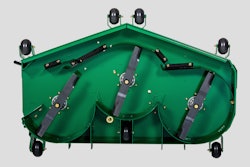
Whether you are a small lawn care operation or a large landscaping company, maintaining adequate cash flow is important, and clients don’t always cooperate.
Sometimes the customer fails to pay you the right amount or doesn’t pay at all.
There are several reasons why this can happen. Some customers make mistakes, paying the wrong amount because they transposed a number or were simply off a little bit on what they thought they were supposed to pay.
If your company – or the customer – is using some type of automated payment software, that system might not have added the extra service you provided that week.
Finally, some customers might have forgotten that your rates for a service were changed, despite your hard work to ensure all clients were notified of the upcoming price increase.
And, of course, if they haven’t paid you at all, it may be that the invoices are going to the wrong person or there is no due date and thus no urgency.
Whatever the reason, outstanding balances should not be allowed to fester. As unpleasant as the chore can be, it’s your responsibility to let the client know that they still owe money for a job. Needless to say, you want to inform them in a manner that does not ruin your reputation with customers.
Depending on how badly you need the correct payment, you have two options when it comes to rectifying the account. If your client is a regular who receives monthly invoices from you, the unpaid amount can be added to next month’s bill. It is important to state on the invoice that the extra charge is for the money that wasn’t paid last time.
The other option is to set a payment deadline in the near future. Set up a clear deadline and reach out to the customer to let them know they have missed part or all of their payment.
Emails are the most common form of communication, but these can get buried or even end up in the spam folder. To ensure the customer is aware of the situation, call them to let them know what is going on.
Try to avoid angry or irritable words or tones when talking with the customer. If you are friendly and understanding, they will appreciate your attitude that their failure to pay must have been an honest mistake.
Once the payment has been made, be sure to thank the customer so they know the matter is settled.
On the flipside of things, customers can fail to pay the right amount, or not pay at all, because of an error on the part of your landscaping company.
When you send a payment request, it’s important to itemize your services. Doing so not only enables customers to see what they’re paying for; it also makes your company more likely to remember to include the extra services that were added later on in a project.
If you want to get paid at all, you need to remember to send out invoices. Some clients won’t bother to pay unless you bill them. The sooner you send out your bill, the more likely they are to pay it in a timely manner.
If you want to receive payment within 30 days, the rule of thumb is to make your payment terms 13 days or less. Average debtors pay invoices two weeks after the due date. Include an actual calendar date so there is no confusion.
When an invoice continues to go unpaid, be persistent in following up through various channels and make sure your collection messages are going to someone with the authority to make payments.










